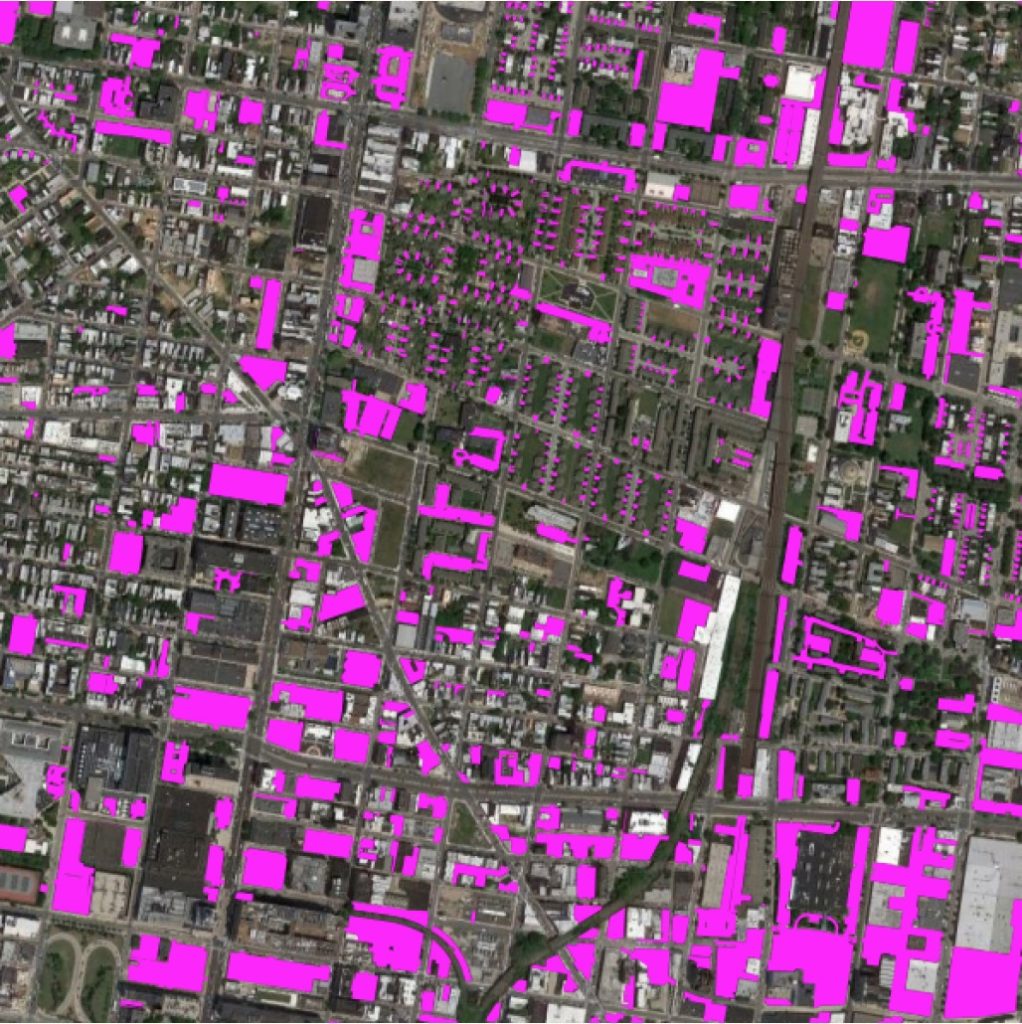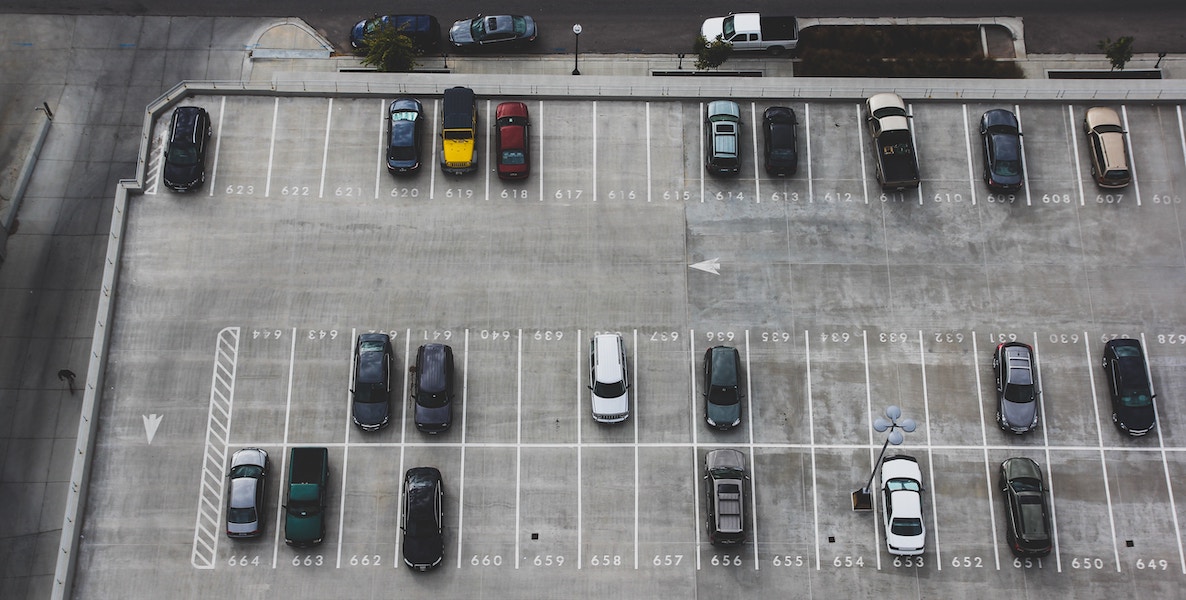“The politics of parking only run one way in this country,” says journalist and author Henry Grabar. “That one way is more parking.”
It’s hyperbole, but only at the margins. America’s love of parking predates the invention of the car. In the era of horses and carriages, urban planners were already prioritizing the need for free and convenient parking in our streetscapes. Then, in the mid-20th century, cities began establishing zoning codes that made developers build more parking as part of any residential or commercial project. These so-called “mandatory parking minimums” — which designate a set amount of spots per residential unit — have resulted in a built environment where there are vastly more parking spaces than people, let alone vehicles, across the country.
For example, in Philly today, there are roughly 3.7 parking spots per household in Philadelphia, about 640,000 more than the population of the city. In fact, parking spots take up more than three times as much land as all of the housing put together in Philly.
“The people who complain the most about new people moving to the neighborhood and parking their cars on the street are people who already live in the neighborhood and park their cars on the street.” — Henry Grabar
So why can’t drivers find a damn spot? One reason for that is that the majority of those parking spots exist off the street, in the form of garages, driveways, and single-use parking lots. People hate to pay for parking, even though it costs them in myriad other ways. Every “free” parking spot that’s created through zoning codes adds roughly 17 percent onto the average cost of rent for an apartment. And people pay that whether or not they own a car.
“Parking minimums are unjustifiable as an urban policy,” says Grabar. “Totally indefensible.”
In his highly-entertaining 2023 book, Paved Paradise: How Parking Explains the World, Grabar makes the case that everything from air quality to crime to affordable housing has been dramatically worsened by America’s misguided thirst for parking.
The book, named as one of the best books of the year by The New Yorker and shortlisted for numerous awards, also argues that the tide might be turning. Cities are increasingly experimenting with new policies and tactics for reducing the negative impacts of parking, especially after the pandemic, and repurposing that space for other needs.
I caught up with with Grabar — a staff writer at Slate — to talk about parking solutions that Philly could consider stealing.
This is a lightly edited version of the conversation.
Malcolm Burnley: Before we talk about parking reforms, can you tell us about what happened in Chicago when it ceded control of its 36,000 parking meters in 2009?
Henry Grabar Sage: Chicago was exploring various offers to privatize some of their public assets, and one of those was their parking meters. And they got an offer from a group of investors led by Morgan Stanley willing to bid more than $1 billion for 75 years of parking-meter revenue. It seemed like a good deal at the price that Chicago was charging for its parking meters when they were discussing this deal, because the city hadn’t made changes to its rates in decades. So they didn’t realize how much on-street parking was even worth. Unfortunately, when Morgan Stanley took control and raised the rates, it turned out to be a very, very lucrative deal for the investors and a very bad one for the city of Chicago. And not only did the bank make their money back pretty quickly, but because Morgan Stanley controlled access to the meters, every time Chicago wants to take a meter out of commission — to hold a parade or put a dumpster outside a construction site or whatever — the city has to write the bank a check for that missing parking meter revenue.
That’s hilarious, but also is there a lesson in that cautionary tale?
The main takeaway is that people’s willingness to pay for parking is higher than anticipated. We often have this reflexive idea that if we make people pay for parking, they’re going to go and park at the mall and drive and do all their business in the suburbs. And I do think it’s true that the urban parking problem is a disincentive for suburban drivers, but one part of that disincentive is that you can’t find parking — and that is not the same as the parking being free.
What do you mean by that?
Expensive parking or parking that you have to pay for is also parking that’s easy to find. I think Chicago realized that, actually, there was a great deal of willingness to pay for parking that they had not previously tapped into because they just did not have the political wherewithal to raise these rates. And the tragedy of it is that that’s a lot of money that could have been put back into public transportation, schools, sidewalks, benches, street trees, etc, and instead it’s just going into the pockets of these investors.
There are roughly three spots for every vehicle in Philly. Why do people incessantly complain about parking if it’s actually abundant?

Nobody wants parking minimums because they think they’re logical or the best way to build a city. They want them because they have street parking and they are concerned that these people moving into these new developments are going to take their street parking. People who have their own parking spaces, like in a residential garage on their property, don’t care how hard it is to find parking on the street. It’s not an issue that concerns them. The people who complain the most about new people moving to the neighborhood and parking their cars on the street are people who already live in the neighborhood and park their cars on the street. And so it’s the people who are actually taking advantage of this under-priced resource, and of the fact that they didn’t have to pay for it when they bought their house because their house doesn’t have parking are the most strident opponents of new residents getting that exact same deal.
In 2011, City Council made some small changes to its mandatory parking minimums. What’s happened in the cities that have done away with them entirely?
Buffalo is one of these cities that did get rid of parking minimums entirely and is a pretty car-oriented place. Once they got rid of the minimums, developers of residential projects were not the ones taking advantage of this [change]. Those projects mostly got built with the same amount of parking that they would have been built with before. But the projects that took advantage of the new rules were mixed-use. So, places that have a grocery store on the ground floor and residences on top, or residences and offices, combining those uses — because those are the places that can take advantage of sharing parking between different uses.
Is the movement to reduce parking requirements only coming from dense cities?
Not necessarily. I’ve seen small towns in Utah that have gotten rid of their parking minimums, and suddenly they find some developer comes along and wants to do an interesting thing that combines the parking from an office building with the residential building and makes everything work on a smaller piece of land. You just don’t know what kind of opportunities are going to come along until you get rid of them.
Has there been backlash in these places?
I don’t think there’s been pushback in Buffalo, or at least if there has, I haven’t heard about it. There have been a few places where there has been pushback. Miami stands out as a place that briefly got rid of parking requirements for small developments and then put them back, apparently because people were parking in front of a Miami Commissioner’s house.
Is it more effective — or politically feasible — to reduce parking minimums for commercial buildings, instead of residential ones or all developments?
New York City is trying to do this right now. It’s requiring quite a lot of political capital, and I think as a result, they’ve decided that they’re going to cut out commercial uses from the reform and they’re only going to have it apply to housing, because housing is what’s on the top of everyone’s mind as the big cost of living issue in New York City. I think that’s a shame to expend all that energy and miss out on commercial uses, since commercial uses can have some of the most egregious parking requirements
Philly 3.0’s Engagement Director and Citizen contributor Jon Geeting once proposed the idea of a “cap-and-trade” system for parking permits in the Citizen years ago. Would making permits more scarce or expensive be a way to get at the problem differently?
Vancouver has a neighborhood where they basically instituted a system to start progressively charging more and more for parking permits. Everybody who already lived in the neighborhood and already had a parking permit got grandfathered into the old pricing system. But if you moved after a certain date, you had to pay the sort of market price, which was designed to make sure that they weren’t giving away more permits than they had spaces on the street. I think this is actually a very effective way of dealing with this solution, because, number one, it’s politically appealing. It rewards long standing residents and gives them a leg up over newcomers in terms of their claim on public space. But it doesn’t make it impossible for newcomers; it just nudges them towards owning fewer cars.
Do you know what the results have been in Vancouver?
I know that the rates [for neighborhood parking permits] have kept going up. Whether that’s had an impact on car ownership, I don’t know. But what we know from basically every study is that the more parking that’s provided, and the cheaper it is, the more people will own cars. There’s a great study out of San Francisco that shows when people can get sorted into affordable housing projects, the more parking that’s included in the affordable housing building, then the more likely those residents are to own a car — and that’s controlling for access to transit, neighborhood, their proximity to jobs, all that stuff.
San Francisco, among other places, has experimented with dynamic pricing for its downtown parking, charging more for some areas (and at certain times). Is that a viable solution in reducing the demand for more parking?
If you think about it, it doesn’t make any sense to have the whole central business district or a whole neighborhood have one flat rate of what the parking meters cost. There are obviously places where people would prefer to park and places where people would prefer not to park. Not everybody has undertaken an experiment on the scale of San Francisco’s, but I do think that it’s an effective strategy. And the fun thing about parking — because there’s so much of it — is you can experiment, right?
The pandemic inspired a lot of alternative uses for parking, like streeteries. It’s only been a few years since then, but has there been any residual impact on parking policies?
This was the biggest change to the streetscape in generations. The number of parking spaces that were actually used for streeteries in New York City, for example, was something like 6,000 in a city of probably 3 million parking spaces. Suddenly everyone seemed to realize all at once: This space could be anything. And that’s a powerful realization. Now, obviously there’s been some retrenchment in places like Philadelphia and New York and Boston, but I think that the epiphany is sticking around.
![]() MORE ON PARKING AND STREET USE
MORE ON PARKING AND STREET USE




